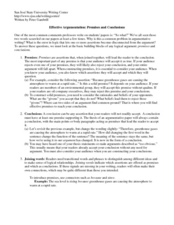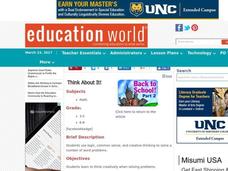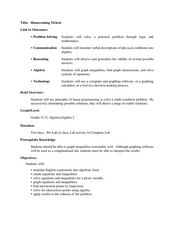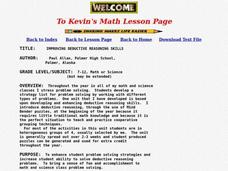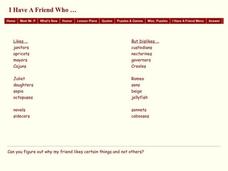EngageNY
Grade 10 ELA Module 4, Unit 2, Lesson 23a
What is the best way to present information concisely and logically? Using an informative resource, scholars review the criteria for a successful presentation. They share their arguments about which character from Shakespeare's Macbeth...
Stanford University
Chronology: Civil Rights in the 20th Century
Test pupils' knowlege of history and the way civil rights movements unfolded using a series of images. With a primary source analysis activity, scholars practice their chronology and deductive reasoning skills. They use their knowledge...
Bonneville
Solar Panel Basics
Going outside is a logical step when dealing with solar panels. Future scientists learn about the n-type and p-type layers of solar cells in the third of 14 lessons in the Cost Effective Solar Cells unit. They go outside to model the...
EngageNY
Organizing an Opinion, Reasons, and Evidence: Text 1 for Each Expert Group
Working in small groups, scholars continue reading an informational text about either Roberto Clemente or Althea Gibson. As they read, pupils create graphic organizers in their journals to help map their ideas logically.
Anti-Defamation League
The Gender Wage Gap
"Equal pay for equal work!" may sound logical but it is not the reality. High schoolers begin a study of the gender wage gap with an activity that asks them to position themselves along a line that indicates whether they strongly agree...
Intel
Forensics: Get a Clue
Although the methods are all scientific, forensic science was started by police officers rather than scientists, who relied on observation and common sense. Young detectives use many tools to solve crimes around the school in a...
San José State University
Effective Argumentation: Premises and Conclusions
Augment argumentative skills with this handout and brief exercise. This resource outlines premises, conclusions, and joining words, and explains how these make up the foundation of logical arguments. After reading through this...
Curated OER
Everyone Has Rules
Young scholars develop awareness of the necessity for rules and use logic to decide what rules make the classroom have a learning and caring atmosphere. They examine the choices they make have consequences.
Curated OER
Presidential endorsements: Newspapers decide
Twelfth graders collect, organize, evaluate and synthesize information from multiple sources in order to draw logical conclusions. They communicate this information using appropriate social studies terminology in oral, written or...
Curated OER
Narrative Nuts and Bolts
After viewing slides and reading about child labor, young authors compose an original narrative story. They practice note-taking skills and work to effectively engage a reader by incorporating plot, logical order, complex characters,...
Curated OER
Inductive and Deductive Reasoning
High schoolers use logical arguments and inductive reasoning to make or disprove conjectures. After observing a teacher led demonstration, students discover that the deductive process narrows facts to a few possible conclusions. In...
Curated OER
The Subjunctive
How are subjunctives incorporated into the writing process? Young grammarians investigate the proper usage of the subjunctive mood, and combine parts of sentences from one column with those from another column to make eight logical...
Curated OER
The Race of Baseball All-Stars
Collect and analyze data. Pupils graph their data and model with it to solve real life problems. They use logic and deductive reasoning to draw conclusions.
Scholastic
Summarizing: Using Hand Motions for Key Words or Points
Learning to summarize texts takes practice. Jump into the training ring and guide your learners through a summarizing practice session. The classic direct instructional practice of "I do, you do, we do" is used to help them identify key...
Curated OER
Think About It!
Students complete ten problems on a "Think About It" worksheet. They can also take a quiz online.
Curated OER
Homecoming Tickets
Students solve word problems using systems of equation. In this algebra lesson, students use computer and graphing to graph and analyze their solution. They solve system involving inequalities.
Curated OER
Math Club #5: Miscellaneous II
In this math club #5: miscellaneous II worksheet, 6th graders work in groups to solve 10 miscellaneous word problems using logic and problem solving skills.
Curated OER
Performing a Play
Students discover logical deduction by participating in a play. In this reasoning lesson, students act as characters from a play who's words must be analyzed to see if they are true or not. Students perform parts of the play and...
Curated OER
Logic
Students solve problems using reasoning techniques, identify the validity or non-validity of problems and use deductive reasoning for problem resolution.
Curated OER
Improving Deductive Reasoning Skills
Students recognize problems that may be solved using deductive reasoning, and develop aids to help them in solving these problems. They produce their own deductive reasoning puzzles for other students to solve.
Curated OER
Using Inspiration To Support Logical Reasoning
Students share descriptions of science experiments they have conducted. They create a thin film on the surface of water in order to float light objects and observe that a paper clip does, indeed, float on the surface of the water at...
Curated OER
Media Literacy: Discovering and Understanding Propaganda
Ninth graders study different types of propaganda and select an issue that is significant to them. In this exploratory lesson students design and create posters on the topic of their choice and write a narrative describing it.
Curated OER
Boxy Math
In this boxy math worksheet, learners use their knowledge of the times tables from 1 to 10 to fill in the missing numbers in a multiplication chart.
Curated OER
I Have a Friend Who?
In this word puzzle worksheet, students find the pattern in two word lists (likes/dislikes).
Other popular searches
- Logic Puzzles
- Logic Problems
- Logical Reasoning
- Logical Sequence
- Logical Thinking
- Logical Order
- Logical Fallacies
- Reasoning Skills
- Boolean Logic
- Hydro Logic Cycle
- Logic Riddles
- Math Logic








